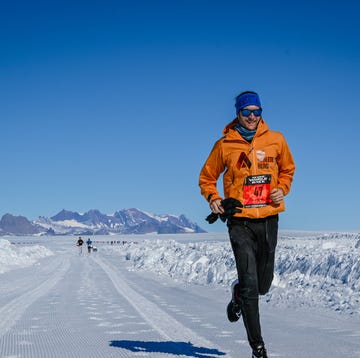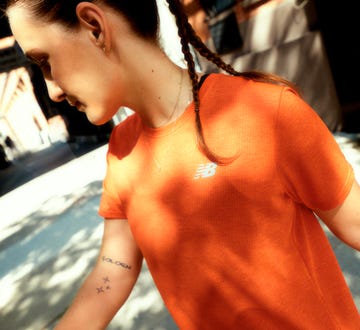Somewhere after Mile 23 of this year’s New York City Marathon, an innocent high-energy spectator jumped onto the course to run with her friend—something you see every so often in a race. She snapped selfies, struck up conversation, and leaped with excitement the way only someone with spectator-fresh legs could.
Some runners might feed off of this energy, but the friend of said spectator clearly wasn’t interested in socializing more than 23 miles into a marathon. She forced a smile through the selfie, rejected the request for a retake, and answered every question as briefly as possible. The friend, still running alongside her, wasn’t getting it: TWe may earn commission from links on this page, but we only recommend products we back, I thought, thankful none of my friends decided this was a good idea. I sped up, so I couldn’t see the painful awkwardness in my peripheral anymore.
Of course, it’s possible this just looked painful to me. I don’t enjoy running with other people—period—least of all at Mile 23 of a marathon. I’ve dodged dozens of casual, “We should run together!” requests from well-meaning extroverts; I’ve bailed on a group lunch run at a former office, then went on my own run five minutes after everyone else left the building; and the few friends I do run with understand that we will listen to music and run at our own paces, as if we’re basically alone, yet together.
It’s not that I’m incapable of running nicely with others. I sometimes run with editors to test gear for brands like Runner’s World. I don’t mind a quick group shakeout run when I’m feeling anxious and jittery the day before a marathon, and I’ve initiated a long-run with a coach I knew would challenge me.
But 90 percent of the time, I’d rather run solo. It’s not just that running is a sacred hour of alone time I might not otherwise have—a time when I can be with my thoughts or let my mind wander (I’ve gotten about a billion business ideas on my long runs over the years).
It’s also that running with others requires an extra ounce of energy that I’m not willing to give mid-run: the energy it takes to read another person’s preferences (is this pace okay?); the energy it takes to make sure she’s still cool with our agreed-upon distance—basically, the energy it takes to be a social human being. I’m cool doing this just about any other time, but my runs are, well, mine.
You might feel differently, and that’s okay—experts say it’s important to understand where you get your energy from. And the sooner you learn what drives you (and what doesn’t), the better your performance will be.
“Introversion and extraversion play out in every area of life, including running,” says Nicole Detling, Ph.D., founder of Headstrong Consulting, mental performance coach with the University of Utah Athletics. “A running group where people are expected to talk to each other would be mentally exhausting for a natural introvert.” That’s a problem, Detling says, “because we know through both research and anecdotally that mental exhaustion can lead to compromised performance.”
That’s why Detling considers someone’s personality when developing a training program for a new athlete. “I need to know where someone gets their ‘juice’ from when things get difficult,” she says. Do you dig deep within for motivation? Or do you look to your cheer squad? Knowing the answer can help you strategize during a race.
Similarly, you need to know what will tire you out mentally at, say, Mile 23 of a marathon. Will you get bored running by yourself for four-plus hours? Then, you might have a hard time during a smaller race (consider breaking out one of these podcasts). Would you hate it if a friend jumped in with streamers and a selfie-stick? Then have a game plan—and tell your friends to stay put on the sidelines ahead of time.
Like most people, I fall somewhere in the middle of the introvert-extrovert spectrum. I wouldn’t sign up for races if I didn’t love the community: high-fives from spectators, conversations with strangers at the start line, pictures with friends at the finish—just spare me any selfies in between miles 20 and 26.













